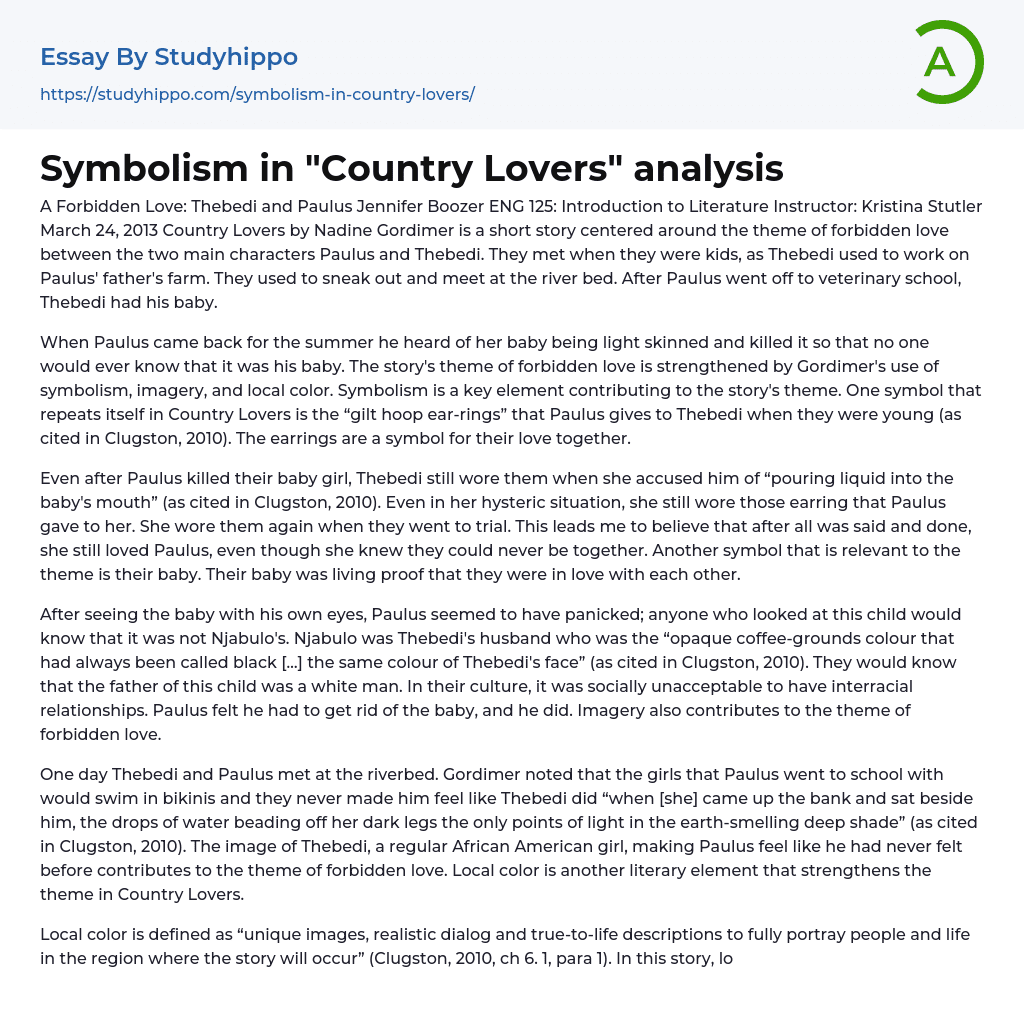"Country Lovers" by Nadine Gordimer is a short story centered around the theme of forbidden love between the two main characters Paulus and Thebedi. They met when they were kids, as Thebedi used to work on Paulus' father's farm. They used to sneak out and meet at the river bed. After Paulus went off to veterinary school, Thebedi had his baby.
When Paulus came back for the summer he heard of her baby being light skinned and killed it so that no one would ever know that it was his baby. The story's theme of forbidden love is strengthened by Gordimer's use of symbolism, imagery, and local color. Symbolism is a key element contributing to the story's theme. One symbol that repeats itself in Country Lovers is the “gilt hoop ear-rings” that Paulus gives to Thebedi when they we
...re young (as cited in Clugston, 2010). The earrings are a symbol for their love together.
Even after Paulus killed their baby girl, Thebedi still wore them when she accused him of “pouring liquid into the baby's mouth” (as cited in Clugston, 2010). Even in her hysteric situation, she still wore those earring that Paulus gave to her. She wore them again when they went to trial. This leads me to believe that after all was said and done, she still loved Paulus, even though she knew they could never be together. Another symbol that is relevant to the theme is their baby. Their baby was living proof that they were in love with each other.
After seeing the baby with his own eyes, Paulus seemed to have panicked; anyone who looked at this
child would know that it was not Njabulo's. Njabulo was Thebedi's husband who was the “opaque coffee-grounds colour that had always been called black […] the same colour of Thebedi's face” (as cited in Clugston, 2010). They would know that the father of this child was a white man. In their culture, it was socially unacceptable to have interracial relationships. Paulus felt he had to get rid of the baby, and he did. Imagery also contributes to the theme of forbidden love.
One day Thebedi and Paulus met at the riverbed. Gordimer noted that the girls that Paulus went to school with would swim in bikinis and they never made him feel like Thebedi did “when [she] came up the bank and sat beside him, the drops of water beading off her dark legs the only points of light in the earth-smelling deep shade” (as cited in Clugston, 2010). The image of Thebedi, a regular African American girl, making Paulus feel like he had never felt before contributes to the theme of forbidden love. Local color is another literary element that strengthens the theme in Country Lovers.
Local color is defined as “unique images, realistic dialog and true-to-life descriptions to fully portray people and life in the region where the story will occur” (Clugston, 2010, ch 6. 1, para 1). In this story, local color is demonstrated in the first paragraph when Gordimer discusses the relationship between the black and white children changes as they grow up. They play together up until they go to school but then after that, the white children do not play with them anymore “even in the the
holidays” (as cited in Clugston, 2010). The white children are apparently oblivious to how society thinks they should act toward black children.
It was not until after they went to school did they learn that they are superior to the black race. It is very important to use different literary elements to strengthen a story so that the reader's attention can be grasped. It is beneficial to the reader when the author uses elements such as symbolism, imagery, and local color because it allows the reader to put his or herself inside the story and feel the forbidden love that Paulus and Thebedi experienced.
References
- Clugston, R. W. (2010). Journey into Literature. Retrieved from: https://content. ashford. edu/books/AUENG125. 10. 2/sections/ch00
- Book Summary essays
- Metaphor essays
- Reader essays
- Rhyme essays
- Literary devices essays
- Villain essays
- Books essays
- Genre essays
- Literary Criticism essays
- Writer essays
- Protagonist essays
- Simile essays
- Poem essays
- Book Report essays
- Book Review essays
- Greek Mythology essays
- Plot essays
- Tragic Hero essays
- Coming of Age essays
- Play essays
- Rhetoric essays
- Rhetorical Question essays
- Translation essays
- Understanding essays
- Reason essays
- Character essays
- Letter essays
- American Literature essays
- Literature Review essays
- Utopia essays
- Poetry Analysis essays
- Dante's Inferno essays
- Between The World and Me essays
- Incidents in The Life of a Slave Girl essays
- Flowers for Algernon essays
- Myth essays
- Everyday Use essays
- Boo Radley essays
- Genesis essays
- Richard iii essays
- Alice in Wonderland essays
- On the road essays
- Ozymandias essays
- The Nightingale essays
- Holden Caulfield essays
- Animal Farm essays
- 1984 essays
- A Hanging essays
- Shooting An Elephant essays
- A Tale Of Two Cities essays




